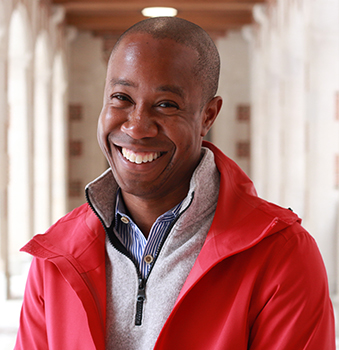AccessComputing Team Profile: Carl

I’m a PhD candidate at the University of Michigan School of Information, and I identify as being neurodivergent. The key to my success has been an unyielding focus on scholarship, service, and self-care.
This past semester, I published my first CHI paper entitled “Problem-Solving Efficiency and Cognitive Load for Adaptive Parsons Problems vs. Writing the Equivalent Code.” This research found that, on average, novice programmers put in less mental effort into solving drag-and-drop problems than equivalent write code problems. But after reading a paper by Drs. Lauren R. Milne and Richard E. Ladner about disabled students’ experiences with block-based/drag-and-drop programming environments, I was left wondering how my results would generalize to students with cognitive and/or learning disabilities like myself. Consequently, I applied for and was awarded a $3,000 grant to investigate how students with learning disabilities learn to program using interactive eBooks with adaptive Parsons problems. My background in English, library, and information science, as well as human-computer interaction, have primed me for working with Dr. Barbara J. Ericson, who is passionate about creating free computing education eBooks.
I also mentored two undergraduates (one of whom was accepted to Google's Computer Science research mentorship program), participated in the hiring of our university’s new student accessibility and accommodation services director, was nominated to attend this year’s Human-Computer Interaction Consortium, and hiked the Garden of the Gods.
My greatest accomplishment, however, is right around the corner. I’m currently working on my dissertation proposal and plan to graduate next year. And I’m even more committed to my goal of working at a tier one research university after participating in the Preparing Future Faculty Seminar facilitated by the Center for Research on Learning and Teaching at my university. Seminars like this expose details about the job search to first-generation college students and give disabled students a chance to ask questions.
The pertinent takeaway from the seminar was that students and faculty with and without disabilities can excel in academia with the right support. I’ve been fortunate to have a partner (Nathan) whom I can talk to about the complexities of being at the intersection of multiple marginalized identities, a mother who has 10+ years’ experience providing specialized services for individuals with brain injuries, autism, and intellectual disabilities, in-laws (Patti and Jim) whose higher education- and disability-related guidance have been invaluable, and friends to laugh with.
Inspiration has also helped guide my path and push me forward. I’m inspired by people like Amy J. Ko, Marcelo Worsley, Michail Giannakos, Maya Israel, Katta Spiel, Richard Ladner, Fred Paas, and Hariharan Subramonyam.
I’m most looking forward to engaging with the communities at the Conference on International Computing Education Research and the International ACM SIGACCESS Conference on Computers and Accessibility. If you’ve never attended them, consider it. I attended them both for the first time last year and found both to be welcoming—special thanks to Lauren Margulieux, Colleen Lewis, and Robin Brewer.
I’ll leave you with three things: If you haven’t seen Crip Camp: A Disability Revolution, go check it out. If you plan on working in academia, join the Association on Higher Education and Disability. And a life lesson in the quote from my friend and former professor Sarah Schulman: “What’s normal is what’s human.”